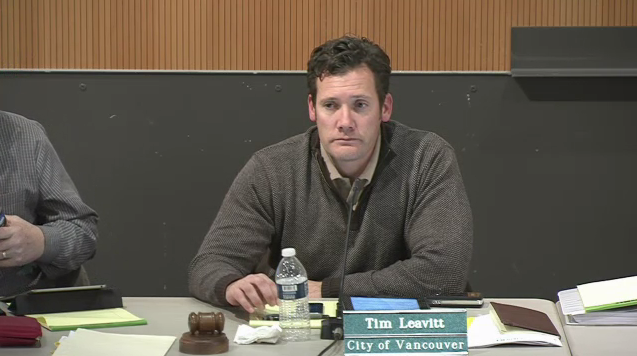C-Tran board publicly, awkwardly discusses light rail deal

For several months, the C-Tran Board of Directors has discussed its controversial light rail contract with TriMet mostly in closed executive sessions.
A surprise motion by Clark County Commissioner David Madore prompted a rare public discussion at this week’s meeting, while board members awkwardly straddled the line between what to keep confidential and what to talk about openly.
Immediately after another executive session on the subject Tuesday, Vancouver Mayor and C-Tran board chair Tim Leavitt started to wrap up the meeting, seemingly expecting no further debate.
He began, “No formal action from the C-Tran board regarding the TriMet operations and maintenance of light rail contract, so we’ll–”
“Excuse me, Mr. Chairman?” Madore jumped in. “I would like to make a motion.”
Leavitt, with a less-than-pleased look on his face, yielded the floor to Madore. The Republican commissioner moved that C-Tran send a letter to TriMet stating that C-Tran considers the agreement “null and void.” Washougal City Councilor Connie Jo Freeman offered a second.
Some background: C-Tran earlier this year sent a letter to TriMet asking that the two agencies jointly terminate the contract tied to the failed Columbia River Crossing project. Last week, TriMet responded by flatly denying that request.
Madore’s motion would have upped the ante, and possibly resulted in a legal dispute between the two transit agencies.
Vancouver City Councilor Jack Burkman said he would oppose the motion, but wouldn’t comment further to avoid disclosing what was discussed in executive session. Madore said his motion was a “decisive action” not connected with that discussion.
The motion ultimately failed by a 5-3 vote. That’s when things got interesting.
“Didn’t we just agree to send a letter?” Freeman asked, apparently referring to the executive session. “So is this going to undo that?”
“What did you just say?” said Vancouver City Councilor Bart Hansen, looking toward Freeman.
“Nothing,” Madore responded.
“Didn’t you just say something?” Hansen said.
“In this motion,” Madore said.
“Be careful what you say,” said Hansen, still looking toward Freeman. “I’m saying that politely. I’m not trying to be — just be very careful what you say. You don’t want to put yourself in a position where you disclose what happened in executive session.”
In Oregon, state law allows reporters to attend executive sessions. Sometimes I wish Washington would follow suit.
